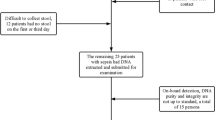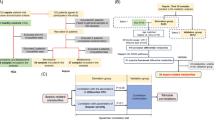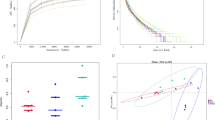Abstract
Sepsis causes high mortality in intensive care units. Although there have been many studies on the gut microbiota in patients with sepsis, the impact of sepsis on the gut microbiota has not been directly determined because the treatment of sepsis also affects the gut microbiota. Therefore, we designed this animal experiment to explore gut microbiota alterations during sepsis. Mice were divided into two groups, mice that survived less than 3 days and mice that survived more than 3 days. Fecal samples collected on the day of cecal ligation and puncture (CLP), as well as on the 3rd and 7th days after CLP, were subjected to microbial community analysis and nontargeted metabolomics analysis. The results showed significantly lower bacterial diversity in fecal samples after CLP. At the genus level, the fecal samples obtained on the 3rd and 7th days after CLP exhibited significantly increased relative abundances of Bacteroides, Helicobacter, etc., and significantly decreased relative abundances of Alloprevotella, Prevotella, etc. Innate metabolite levels were significantly different in mice that survived less than 3 days and mice that survived more than 3 days. In conclusion, CLP-induced sepsis in mice changes the structure of the gut microbiome, and innate metabolites affect the prognosis of septic mice.






Similar content being viewed by others
Data availability
The datasets generated during the current study are available in the NCBI repository, https://www.ncbi.nlm.nih.gov/bioproject/PRJNA758244.
References
Adak A, Khan MR (2019) An insight into gut microbiota and its functionalities. Cell Mol Life Sci 76(3):473–493. https://doi.org/10.1007/s00018-018-2943-4
Adelman MW, Woodworth MH, Langelier C, Busch LM, Kempker JA, Kraft CS, Martin GS (2020) The gut microbiome’s role in the development, maintenance, and outcomes of sepsis. Crit Care 24(1):278. https://doi.org/10.1186/s13054-020-02989-1
Arpaia N, Campbell C, Fan X, Dikiy S, van der Veeken J, deRoos P, Liu H, Cross JR, Pfeffer K, Coffer PJ, Rudensky AY (2013) Metabolites produced by commensal bacteria promote peripheral regulatory T-cell generation. Nature 504(7480):451–455. https://doi.org/10.1038/nature12726
Chai N, Zhang H, Li L, Yu X, Liu Y, Lin Y, Wang L, Yan J, Nikolaevna SE, Zhao Y (2019) Spermidine Prevents Heart Injury in Neonatal Rats Exposed to Intrauterine Hypoxia by Inhibiting Oxidative Stress and Mitochondrial Fragmentation. Oxid Med Cell Longev 2019:5406468. https://doi.org/10.1155/2019/5406468
Chen JR, Lazarenko OP, Zhang J, Blackburn ML, Ronis MJ, Badger TM (2014) Diet-derived phenolic acids regulate osteoblast and adipocyte lineage commitment and differentiation in young mice. J Bone Miner Res 29(5):1043–1053. https://doi.org/10.1002/jbmr.2034
Dahlgren AF, Pan A, Lam V, Gouthro KC, Simpson PM, Salzman NH, Nghiem-Rao TH (2019) Longitudinal changes in the gut microbiome of infants on total parenteral nutrition. Pediatr Res 86(1):107–114. https://doi.org/10.1038/s41390-019-0391-y
Dai W, Bi J, Li F, Wang S, Huang X, Meng X, Sun B, Wang D, Kong W, Jiang C, Su W (2019) Antiviral efficacy of flavonoids against enterovirus 71 infection in vitro and in newborn mice. Viruses 11(7):625. https://doi.org/10.3390/v11070625
El-Bakoush A, Olajide OA (2018) Formononetin inhibits neuroinflammation and increases estrogen receptor beta (ERbeta) protein expression in BV2 microglia. Int Immunopharmacol 61:325–337. https://doi.org/10.1016/j.intimp.2018.06.016
Han C, Guo N, Bu Y, Peng Y, Li X, Ma X, Yang M, Jia X, Zhang J, Liu X, Yu K, Wang C (2021) Intestinal microbiota and antibiotic-associated acute gastrointestinal injury in sepsis mice. Aging (albany NY) 13(7):10099–10111. https://doi.org/10.18632/aging.202768
Huang SS, Lin JY, Chen WS, Liu MH, Cheng CW, Cheng ML, Wang CH (2019) Phenylalanine- and leucine-defined metabolic types identify high mortality risk in patients with severe infection. Int J Infect Dis 85:143–149. https://doi.org/10.1016/j.ijid.2019.05.030
Hyoju SK, Zaborin A, Keskey R, Sharma A, Arnold W, van den Berg F, Kim SM, Gottel N, Bethel C, Charnot-Katsikas A, Jianxin P, Adriaansens C, Papazian E, Gilbert JA, Zaborina O, Alverdy JC (2019) Mice fed an obesogenic western diet, administered antibiotics, and subjected to a sterile surgical procedure develop lethal septicemia with multidrug-resistant pathobionts. mBio 10(4). https://doi.org/10.1128/mBio.00903-19
Imhann F, Bonder MJ, Vich Vila A, Fu J, Mujagic Z, Vork L, Tigchelaar EF, Jankipersadsing SA, Cenit MC, Harmsen HJ, Dijkstra G, Franke L, Xavier RJ, Jonkers D, Wijmenga C, Weersma RK, Zhernakova A (2016) Proton pump inhibitors affect the gut microbiome. Gut 65(5):740–748. https://doi.org/10.1136/gutjnl-2015-310376
Lankelma JM, van Vught LA, Belzer C, Schultz MJ, van der Poll T, de Vos WM, Wiersinga WJ (2017) Critically ill patients demonstrate large interpersonal variation in intestinal microbiota dysregulation: a pilot study. Intensive Care Med 43(1):59–68. https://doi.org/10.1007/s00134-016-4613-z
Leitner DF, Siu Y, Korman A, Lin Z, Kanshin E, Friedman D, Devore S, Ueberheide B, Tsirigos A, Jones DR, Wisniewski T, Devinsky O (2023) Metabolomic, proteomic, and transcriptomic changes in adults with epilepsy on modified Atkins diet. Epilepsia. https://doi.org/10.1111/epi.17540
Li Q, Wang C, Tang C, He Q, Zhao X, Li N, Li J (2015) Successful treatment of severe sepsis and diarrhea after vagotomy utilizing fecal microbiota transplantation: a case report. Crit Care 19:37. https://doi.org/10.1186/s13054-015-0738-7
Ma C, **a R, Yang S, Liu L, Zhang J, Feng K, Shang Y, Qu J, Li L, Chen N, Xu S, Zhang W, Mao J, Han J, Chen Y, Yang X, Duan Y, Fan G (2020) Formononetin attenuates atherosclerosis via regulating interaction between KLF4 and SRA in apoE(-/-) mice. Theranostics 10(3):1090–1106. https://doi.org/10.7150/thno.38115
Marin L, Miguelez EM, Villar CJ, Lombo F (2015) Bioavailability of dietary polyphenols and gut microbiota metabolism: antimicrobial properties. Biomed Res Int 2015:905215. https://doi.org/10.1155/2015/905215
McDonald D, Ackermann G, Khailova L, Baird C, Heyland D, Kozar R, Lemieux M, Derenski K, King J, Vis-Kampen C, Knight R, Wischmeyer PE (2016) Extreme Dysbiosis of the Microbiome in Critical Illness. mSphere 1(4). https://doi.org/10.1128/mSphere.00199-16
Ong SKL, Shanmugam MK, Fan L, Fraser SE, Arfuso F, Ahn KS, Sethi G, Bishayee A (2019) Focus on formononetin: anticancer potential and molecular targets. Cancers (Basel) 11(5). https://doi.org/10.3390/cancers11050611
Perler BK, Friedman ES, Wu GD (2023) The Role of the Gut Microbiota in the Relationship Between Diet and Human Health. Annu Rev Physiol 85:449–468. https://doi.org/10.1146/annurev-physiol-031522-092054
Pietrocola F, Castoldi F, Kepp O, Carmona-Gutierrez D, Madeo F, Kroemer G (2019) Spermidine reduces cancer-related mortality in humans. Autophagy 15(2):362–365. https://doi.org/10.1080/15548627.2018.1539592
Rooks MG, Garrett WS (2016) Gut microbiota, metabolites and host immunity. Nat Rev Immunol 16(6):341–352. https://doi.org/10.1038/nri.2016.42
Schulthess J, Pandey S, Capitani M, Rue-Albrecht KC, Arnold I, Franchini F, Chomka A, Ilott NE, Johnston DGW, Pires E, McCullagh J, Sansom SN, Arancibia-Carcamo CV, Uhlig HH, Powrie F (2019) The Short Chain Fatty Acid Butyrate Imprints an Antimicrobial Program in Macrophages. Immunity 50(2):432-445 e437. https://doi.org/10.1016/j.immuni.2018.12.018
Sender R, Fuchs S, Milo R (2016) Are We Really Vastly Outnumbered? Revisiting the Ratio of Bacterial to Host Cells in Humans. Cell 164(3):337–340. https://doi.org/10.1016/j.cell.2016.01.013
Shimizu K, Ogura H, Hamasaki T, Goto M, Tasaki O, Asahara T, Nomoto K, Morotomi M, Matsushima A, Kuwagata Y, Sugimoto H (2011) Altered gut flora are associated with septic complications and death in critically ill patients with systemic inflammatory response syndrome. Dig Dis Sci 56(4):1171–1177. https://doi.org/10.1007/s10620-010-1418-8
Singer M, Deutschman CS, Seymour CW, Shankar-Hari M, Annane D, Bauer M, Bellomo R, Bernard GR, Chiche JD, Coopersmith CM, Hotchkiss RS, Levy MM, Marshall JC, Martin GS, Opal SM, Rubenfeld GD, van der Poll T, Vincent JL, Angus DC (2016) The Third International Consensus Definitions for Sepsis and Septic Shock (Sepsis-3). JAMA 315(8):801–810. https://doi.org/10.1001/jama.2016.0287
Suez J, Zmora N, Zilberman-Schapira G, Mor U, Dori-Bachash M, Bashiardes S, Zur M, Regev-Lehavi D, Ben-Zeev Brik R, Federici S, Horn M, Cohen Y, Moor AE, Zeevi D, Korem T, Kotler E, Harmelin A, Itzkovitz S, Maharshak N, Shibolet O, Pevsner-Fischer M, Shapiro H, Sharon I, Halpern Z, Segal E, Elinav E (2018) Post-Antibiotic Gut Mucosal Microbiome Reconstitution Is Impaired by Probiotics and Improved by Autologous FMT. Cell 174(6):1406-1423 e1416. https://doi.org/10.1016/j.cell.2018.08.047
Taur Y, Jenq RR, Perales MA, Littmann ER, Morjaria S, Ling L, No D, Gobourne A, Viale A, Dahi PB, Ponce DM, Barker JN, Giralt S, van den Brink M, Pamer EG (2014) The effects of intestinal tract bacterial diversity on mortality following allogeneic hematopoietic stem cell transplantation. Blood 124(7):1174–1182. https://doi.org/10.1182/blood-2014-02-554725
Wang G, Liu H, Liu Y, Li H, Li Z, Shao G, Lv X (2020) Formononetin alleviates Streptococcus suis infection by targeting suilysin. Microb Pathog 147:104388. https://doi.org/10.1016/j.micpath.2020.104388
**e J, Wang H, Kang Y, Zhou L, Liu Z, Qin B, Ma X, Cao X, Chen D, Lu W, Yao C, Yu K, Yao X, Shang H, Qiu H, Yang Y, Investigators C.H.E.S.o.S.S (2020) The Epidemiology of Sepsis in Chinese ICUs: A National Cross-Sectional Survey. Crit Care Med 48(3):e209–e218. https://doi.org/10.1097/CCM.0000000000004155
Yi, Cui J, Wang W, Tang W, Teng F, Zhu X, Qin J, Wuniqiemu T, Sun J, Wei Y, Dong J (2020) Formononetin Attenuates Airway In fl ammation and Oxidative Stress in Murine Allergic Asthma. Front Pharmacol 11:533841. https://doi.org/10.3389/fphar.2020.533841
Zaborin A, Smith D, Garfield K, Quensen J, Shakhsheer B, Kade M, Tirrell M, Tiedje J, Gilbert JA, Zaborina O, Alverdy JC (2014) Membership and behavior of ultra-low-diversity pathogen communities present in the gut of humans during prolonged critical illness. mBio 5(5):e01361-01314. https://doi.org/10.1128/mBio.01361-14
Funding
This work was supported by the National Natural Science Foundation of China (No. 81770276, U20A20366).
Author information
Authors and Affiliations
Contributions
All authors participated in the design and interpretation of the studies, the analysis of the data and the review of the manuscript. Kaijiang Yu, Changsong Wang and **aohui Ma designed the experiments. **aohui Ma, **aonan Jia, Yahui Peng and Xueting Li conducted the experiments. **aohui Ma analyzed the data and wrote the manuscript.
Corresponding author
Ethics declarations
Ethical statement
Experiments were performed under a project license (NO. KY2018-02) granted by regional ethics board of Harbin Medical University Cancer Hospital on December 2018, in compliance with chinese guidelines for the care and use of animals. The chairperson of the ethics committee is Changhong Zhao.
Competing interests
The authors declare no potential conflicts of interest with respect to the research, authorship, or publication of this article.
Additional information
Publisher's note
Springer Nature remains neutral with regard to jurisdictional claims in published maps and institutional affiliations.
Supplementary information
Below is the link to the electronic supplementary material.
Rights and permissions
Springer Nature or its licensor (e.g. a society or other partner) holds exclusive rights to this article under a publishing agreement with the author(s) or other rightsholder(s); author self-archiving of the accepted manuscript version of this article is solely governed by the terms of such publishing agreement and applicable law.
About this article
Cite this article
Ma, X., Jia, X., Peng, Y. et al. Gut microbiota disruption during sepsis and the influence of innate metabolites on sepsis prognosis. Int Microbiol 26, 929–938 (2023). https://doi.org/10.1007/s10123-023-00349-x
Received:
Revised:
Accepted:
Published:
Issue Date:
DOI: https://doi.org/10.1007/s10123-023-00349-x




